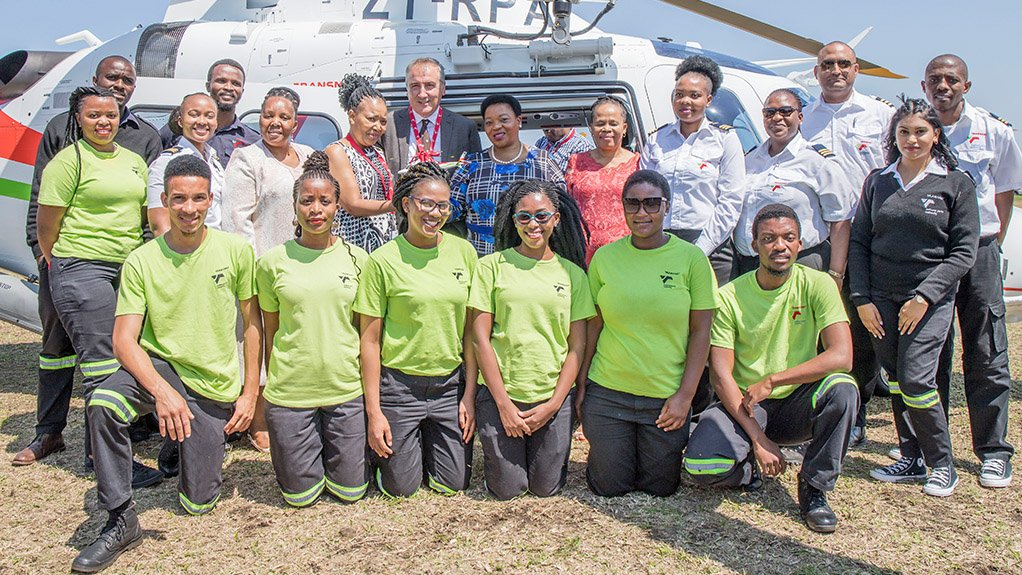/ MEDIA STATEMENT / The content on this page is not written by Polity.org.za, but is supplied by third parties. This content does not constitute news reporting by Polity.org.za.
Throughout September 2020 and into Transport Month in October, port landlord Transnet National Ports Authority (TNPA) commemorated its 20th year of existence and the strides made since its first group of marine trainees of colour, including females, began their maritime careers two decades ago.
More recently, TNPA has also developed its own insourced aviation service, manned by a new generation of helicopter pilots and avionics engineers from previously disadvantaged backgrounds, taking its transformation agenda to the skies.
Around two decades ago, TNPA introduced the first helicopter marine pilot transfer service in the world. The brainchild of a previous Harbour Master, Captain Neil Brink at the Port of Richards Bay, the service has become the norm at both Durban and Richards Bay where it has been so successful that TNPA is planning to introduce the it at the Port of Cape Town from 2021.
However, years ago TNPA’s aviation service caught the attention of the Chief Harbour Master, Captain Rufus Lekala, who noted that while TNPA owned its own helicopters, the service was outsourced to a company that had not a single person of colour amongst the Pilots and Maintenance Engineers delivering the service. He believed the contractors did not take the issue of transformation seriously enough.
Captain Lekala began work on a strategy that would migrate the service in-house, which was well supported by the Transnet board. The first step was to hire an aviation expert, Agrippa Mpofu, who joined TNPA from the Civil Aviation Authority and together they prepared a position paper that would deliver a full complement of helicopter pilots and avionics engineers to meet TNPA’s needs within five years.
The contract was structured in such a way that each year the percentage of outsourced pilots and aircraft maintenance engineers would diminish, while the percentage of TNPA’s own pilots and engineers would increase commensurately until all positions were taken up by qualified TNPA personnel.
The proposal was approved in July 2012 and the first training began in 2014. “By 2019 all 20 pilots had obtained their commercial pilot’s licences and the first six of 14 engineers in training had qualified with their aircraft maintenance engineering licences, with the remaining eight set to qualify in the next two years. This gave us the full complement to run our own operation in-house.
“We have 26 pilots available, 20 of whom are from TNPA’s training programme and 50% of these are women. We had a strike rate of 100%. All of our trainees came from previously disadvantaged backgrounds and all of them have passed their various certifications along the way – a great source of pride and another significant milestone on our transformation journey,” Lekala said.
Building TNPA’s aviation service from the ground up
As a youngster, Agrippa Mpofu, Senior Operations Manager was fascinated by aeroplanes and curious to understand how huge machines carrying heavy loads could take off into the sky. This spurred him on to become an Aircraft Maintenance Engineer at Oliver Tambo Airport, where he worked for South African Airlink and South African Express.
Agrippa has never stopped learning. He completed a Management Advancement Programme (MAP) at Wits Business School and holds a Master of Business Administration (MBA). Later he joined the Civil Aviation Authority where he gained in depth knowledge about the regulatory environment and what was required to run an aviation service. His background made him the perfect candidate to build TNPA’s aviation service from the ground up, opening up opportunities for talented youngsters from previously disadvantaged backgrounds, who
had never dreamed of flying a helicopter, to join TNPA’s ranks as professional pilots and aircraft engineers.
Agrippa’s proudest moments have been seeing the trainees selected for these two career paths in aviation meet their certification requirements, some with flying colours. The programme has been a game changer not just
enabling TNPA to deliver this service in-house, but changing the lives of a new generation of skilled professionals, who are passionate and committed about being the best they can be.
Agrippa speaks passionately about the service, pioneered by TNPA. “It is unique and challenging because of the risks involved in lowering a human being from a helicopter safely onto a vessel, often at night, in different weather conditions.”
Issued by Transnet National Ports Authority
EMAIL THIS ARTICLE SAVE THIS ARTICLE ARTICLE ENQUIRY
To subscribe email subscriptions@creamermedia.co.za or click here
To advertise email advertising@creamermedia.co.za or click here











